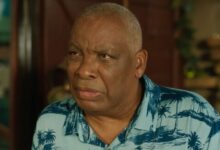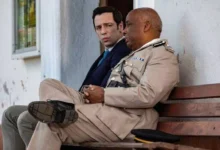British detective Richard Preston reveals real-life adventures behind Dᴇᴀᴛʜ In Paradise
Richard Preston on Seven Mile Beach – Dᴇᴀᴛʜ in Paradise – DX FEATURE – PR SUPPLIED (Image: DX Features)
Richard Preston Royal Cayman Islands Police – Smith Cove – Death in Paradise DX FEATURE – PR SUPPL (Image: -)
Who wouldn’t jump at the chance to work in a tropical paradise, live in a luxury hotel suite, drive a jeep, learn to scuba dive and even buy a share in a speedboat? So obviously British detective Richard Preston signed up straight away.
However, when he finally got round to fighting crime in the Caribbean, he found life in the infamous tax-haven far more interesting than he could ever have imagined.
Now he has written a wonderful memoir, The Real Dᴇᴀᴛʜ In Paradise, recounting his two idyllic years as one of 12 young police officers seconded to the tropical paradise.
Currently enjoying its 14th season, Dᴇᴀᴛʜ In Paradise draws a regular audience of eight million to its warming, whodunnit plots.
And while Richard says the BBC’s Caribbean “cosy-crime” series is entirely realistic, he admits: “To be honest, if
anything the series is underplayed.”
-The Real Dᴇᴀᴛʜ in Paradise by Richard Preston (Image: -)
Now 65, he was 29 when he took up his two-year posting on the 22-mile long island.
His work included preventing turtle egg kidnapping, busting a rum smuggling ring and capturing murderous pirates.
He even had a voodoo curse put upon him “by a vicious witchdoctor”.
“When I saw the first series a decade ago, I kicked myself,” he recalls, laughing. “I thought, ‘This is my idea’ – there, on the screen.”
For years, he had been planning to write up the journal he kept throughout his secondment, but his work as a counter-terrorism officer kept getting in the way.
“When I watched a couple of the earliest episodes, I thought there was a direct connection with my own experience of being a policeman on a Caribbean island, with the sunshine and all the strange happenings.
“But many of the real events were even stranger than those in the TV series. In fact, a few things happened to me which made me think, ‘This could not have happened anywhere else in the world’.
“Among other things, I uncovered a suspected Nazi war criminal, arrested a shipload of murderous pirates, dealt with corrupt police officers, and was cursed by a vicious voodoo witch doctor named Professor Marmaduke.”
So if you’re a fan of the goings on in the town of Honoré on the fictitious island of Saint Marie, Richard’s book reveals that truth really can be stranger than fiction.
“Initially we scoffed at the offences involving voodoo, or obeah as it is known locally. But we were told that obeah is endemic on the islands,” he continues.
“At that stage I did not understand the raw power it had over some people, but I soon experienced its impact, first hand.
“Marmaduke had assaulted a young lad who had bought a spell from him – ironically to keep him safe – decided he hadn’t paid enough and beat him up.
“When I approached the court house to give evidence during his trial, a circle of people were standing around the public entrance.
“When I pushed through I saw a putrefying cane toad with a shiny metal padlock holding its mouth closed on the door handle. I’d had enough by that point, ripped it off and threw it in the bushes.”
There was a collective gasp before the crowd ran away in terror.
“Inside, Marmaduke arrived wearing a trilby with various coloured feathers stuck in it, until the local judge – a QC who had qualified in Jamaica – said ‘take that ridiculous hat off – you look like you’ve lost a fight with a chicken’.” Marmaduke admitted he had cursed his arresting officer with voodoo magic – a crime in the Cayman Islands – and was fined.
“It was a bit disconcerting for a few weeks wondering if I was going to grow six toes, or worse,” smiles Richard.
He reveals it was through pure chance that he got to swap his squad car in the Pennines for a Jeep on the island beat of the Cayman Islands, 4,500 miles away.
Flicking through Police Review magazine in 1989, he noticed a recruitment advert for 12 single, male British policemen.
“You couldn’t advertise like that now, but few locals wanted to join the police force in the Cayman Islands as they could make more money from other activities, including crime and tourism.
“The opportunity answered my dreams perfectly,” he recalls.
“I was still going out with my UK-based girlfriend, but that wasn’t the case for my colleagues. With rich students arriving on direct flights from North America, let’s just say that there was a lot of ‘cheerfulness’.”
His first encounter with the inspector in charge was in the police social club where a strange little man in a string vest with “tufts of body hair sprouting through the material” tapped him on the shoulder.
“He said ‘do you like traffi-ticki?’ I asked him to repeat himself, thinking it was a local delicacy.”
A nearby officer assisted, explaining that Inspector McDougal was wondering if he was interested in issuing traffic tickets to offending motorists. “My first priority was targeting criminals and drug dealers who made the lives of decent people difficult.
“But on our first shifts he gave us a ticket book and made us go out and issue a ticket to somebody… anybody.
“We were all highly experienced officers with different skills – I’d been undercover for six months in CID. We tended to go and sit in the bakery in the harbour, have lunch, and work out what to do.”
On one occasion this meant giving a ticket to an elderly Jamaican called Mr Appleton General. “For the most part, the laws in the Cayman Islands were based on British laws, albeit 30 years out of date.
“But there was this one ridiculous law that you had to fit a $10 (£8) government tag to your bicycle seat.
“Mr General told me he couldn’t afford it until his war pension came in – he had been a stoker in the Royal Navy during the war.
“My inspector was watching from the squad car, so I discretely paid the fine for him until his pension came through.”
A few months later, Mr General came into the police station and asked for Richard by name, having lost his wallet with $200 (£160) in it.
“It contained his only photograph of himself in the Royal Navy. I was unable to prove who had taken it but he thanked me for trying with the words ‘you know who’s done it and the good Lord knows, too’.”
A few months later, when a Royal Navy frigate called into the harbour, Richard arranged for Mr General to go on board for “a bangers and mash party” with the crew.
“It was just a bit of something to acknowledge his history,” he says.
On another occasion, on beach patrol late one night, he saw a 4ft-long mother turtle crawling determinedly towards the soft sand in front of a luxury hotel where she dug a huge hole with her flippers, before depositing her eggs.
“I watched for an hour as she crawled, exhausted, back to the sea,” he remembers.
“My job was to protect the site so the Cayman Islands Turtle Trust could excavate the nest and rescue the 99 tiny turtle eggs inside.
“Had they been left then only 1% may have reached maturity – there was a risk they could have been smuggled off the islands where the export of these protected creatures or their shells is prohibited.”
After his first year of uniformed patrol duties – dealing with fights, low level drug dealing, assaults and fines – Richard got a place on the drugs squad and also solved a couple of murders.
The killings included that of a friendly jeweller named Mr Brown, whose shop was popular with the monied cruise-ship crowd – as well as with British policemen seeking a glass of water in the searing heat.
“One day he opened his vault and showed me a huge slab of gold, the size of a paperback book. He told me it had come from a Spanish bullion fleet that sunk in 1715 but was originally Aztec.
“Months later a local hoodlum, known as Toad Face shot Mr Brown dead in an attempted robbery, before jumping on a bicycle and cycling away.”
After a huge manhunt and his capture, “Toad Face” was subsequently charged with murder and sentenced to Dᴇᴀᴛʜ by hanging by three judges from Jamaica. A scaffold began to take shape in the courtyard of the prison – overlooked by his cell.
“A few days later I was in my suite in the hotel when I got a call from the Deputy Chief Inspector to say ‘get you’re a**e down here – Toad Face has escaped’.
“Like something out of the Great Escape, he had crawled under the wire fencing and was at large for a week until the events in Chapter 23 of my book – titled ‘Gunfight at the Old Haunted Plantation House’.
“We went into this address in the swamp, put the door in, and an elderly lady chased the drug squad out with a fish filleting knife.
“It was the wrong house. We got him in the end using the dog handler from the US, as our local drug dog was a sloth who only understood German.”
Six months later, capital punishment was removed from the Cayman Island’s penal code and the Privy Council commuted Toad Face’s sentence to life imprisonment.
“The scaffold was dismantled – to the upset of the prison warders,” smiles Richard who enjoyed a successful career in counter terrorism upon his return from the Caribbean, and currently works as the security advisor to the Red Cross. “Like I said, you couldn’t make it up.”
● The Real Dᴇᴀᴛʜ In Paradise by Richard Preston (John Blake, £9.99) is out now. Visit express bookshop.com or call Express Bookshop on 020 3176 3832. Free UK P&P on online orders over £25







